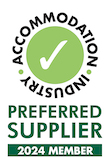The benefits of using reusable napkins over paper napkins
Constantly replenishing your supply of paper napkins can be frustrating, especially if you use hundreds of them every week. If you’re tired of continually purchasing napkins, switching to reusable cloth napkin maybe your best option.
Cloth vs Paper Napkins pros and cons
Cleanliness
If your business has a reliable laundry service and strict rules around handling, switching to reusable napkins will be more hygienic. Regular washing lowers the risk of contamination and illness, which keeps employees and customers safe.
Appearance and image
Customers will often view a food and beverage establishment as more professional if they provide reusable napkins. These look fancier and can enhance the dining experience. Learning how to fold a cloth napkin can help you use them as decorative pieces, and purchasing colours that match your décor can create an aesthetically pleasing environment for customers.
Cost-Effectiveness
Paper napkins have a lower initial cost; however, you will need to constantly replace your supply. This will lead to further expenses in the future and more stress on employees. Purchasing reusable napkins for food and beverage establishment will be more economical in the long run. If you are considering purchasing reusable napkins for your home kitchen, it can save you the hassle of adding napkins to your weekly shopping list.
Sustainability
Though disposable napkins are usually made of paper, used ones are considered contaminated and cannot be recycled. Instead, they end up in your trash and, eventually, landfill.
While paper napkins are thrown out after use, cloth napkins can be washed repeatedly. Once they reach the end of their lives, they can be repurposed into something else, such as a cleaning rag, or sent to a textiles recycling service. If your napkins are made of a natural material such as bamboo or hemp, you can even compost them.
What are the best cloth napkins for your needs?

Linen napkins
Linen napkins are a top choice if you want to invest in napkins that are sustainable, durable, and absorbent. They are more environmentally friendly than disposable napkins and more environmentally friendly than their cotton counterparts. Linen absorbs well, making it perfect for mopping up spills efficiently.
Cotton napkins
Cotton is another durable material that can be good for reusable napkins. Cotton Napkins are cheaper than linen napkins, and if you want to up the quality, you can always opt for a linen-cotton blend.
Polyester napkins
Not only are polyester and poly-cotton napkins blends absorbent, but they come in a wide variety of colours and designs which can be selected to match the décor of your business or home kitchen.
 |
||
Still unsure about what reusable cloth napkin material you need?
Talk to one of our linen experts. The team at Australian Linen Supply are specialists in linen matters and will answer all your questions. Contact us now!
How to care for cloth napkins
Treat stains immediately
You are most likely to get stains from your linen if you deal with them immediately. If someone uses their napkin to wipe up their spilled tomato soup, you must clean it immediately.
Dry your linen
To maintain quality and hygiene, thoroughly dry your cloth napkins after washing them. This ensures that your linen doesn’t become a breeding ground for harmful bacteria.
Store them in a cool, dry place
It is also important to store your reusable napkins in a dry environment. Otherwise, they can become riddled with bacteria, which can harm employees, customers, and family members.
Don’t store linen in plastic containers.
The inside of plastic containers can become humid quickly, which attracts bacteria, mould, and mildew. If you have to store them in plastic tubs, don’t put a lid on them.
Wash at the appropriate temperature
When your napkins come into contact with food, it is important you wash them at the appropriate temperature to rid them of any bacteria. All linen should be washed at a minimum of 60 degrees celsius to ensure harmful germs are killed.
Using cloth napkins at home
Cloth napkins are not just beneficial to restaurants, cafes, and bars. Switching from paper to cloth napkins can be a great step in making your home more sustainable, as well as saving you money in the long run. Once your napkins reach the ends of their lives, they can be repurposed into cleaning rags or recycled.

Photo by Hannah Busing on Unsplash
ORDER YOUR TABLE LINEN TODAY!
Replace the paper napkin with cloth napkins to elevate your restaurant experience or transform your dinner tables.
For stylish and affordable food & beverage linen, including tablecloth and napkin - check out our table linen collection.
You may also like:
- How to set a restaurant table;
- Easy tips to create an event seating arrangement plan like a pro
- Easy and Interesting Ways to Fold Your Restaurant’s Cloth Napkin
Featured photo by Lightscape on Unsplash

















